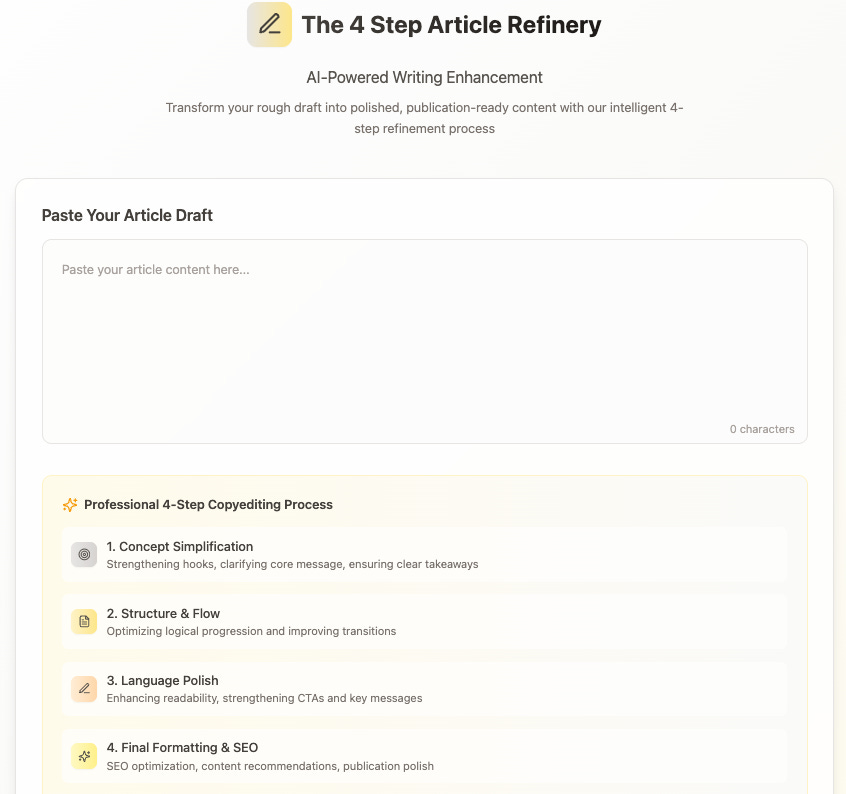Why Ethical AI Is Harder Than It Looks (And What to Do About It)
If you're worried about using AI but don't want to lose your voice, this is your roadmap.
There’s an old craftsman’s rule I’ve always loved: never let the tool think for you.
Since I was little, growing up in Bolivia, I've loved making wooden carvings, small animals, simple figures, anything I could shape with my hands and a chisel. Even now, I still find peace in it. One thing you learn quickly: the tool matters and allows you to accomplish much, but it has no influence on the end product. The end product comes from my skill, my expertise, and my plan.
The same is true with AI.
Today, AI has the potential to help you create. Fast, powerful, precise. But like the chisel, it's not made to decide on the end product. That decision is on us. That's the whole premise behind ethical AI. Ethical AI begins not with code, but with character and the strategy that leads the chisel. That's still human work.
"Technology is a useful servant but a dangerous master." — Christian Lous Lange, Norwegian Historian.
The Real Pressure Behind AI for Creators
Let’s name what most of us feel but rarely say out loud: it’s not just the excitement of new tools, it’s the pressure to use them fully and immediately. For more, read Leadership and the AI Pressure Cooker.
For many creators and leaders, especially those juggling decades of wisdom with the velocity of digital change, the rise of AI hasn’t felt like an invitation. It’s felt like an ultimatum.
Suddenly, content must be faster, emails sharper, posts optimized. And if you're not using AI, you’re told you’re falling behind.
But here's what I've noticed talking to creators everywhere. The real tension isn't technical. It's deeply personal:
Will I lose what makes my work mine if I do?
This is the quiet anxiety behind the AI boom, especially for those who've spent years developing a craft, a voice, a way of leading or creating that's deeply human. The fear isn't just about efficiency, it's about self-replacement.
That's exactly why this conversation about ethical AI matters. Not because we're anti-progress, but because we're pro-human-progress.
What Makes AI Use Ethical (And Why That’s Not Obvious)
"Ethical AI" sounds like a software issue, but it’s more than that.
The truth is, tools are used ethically based on what we notice, what we prioritize, and how we produce. The ethics of AI for creators isn't just about plagiarism or accuracy; it's about presence, authorship, and who holds the creative compass.
Here are three subtle risks of unchecked AI use:
Disembodiment – When our words become generic, disconnected from our lived experience.
Dependency – When we feel unable to create without a prompt or pattern.
Distortion – When the algorithm’s logic dilutes the nuance of our convictions.
AI without emotional grounding risks becoming efficient but hollow. Marvin Minsky, a pioneer in AI, framed it clearly: "The question is not whether intelligent machines can have any emotions, but whether machines can be intelligent without any emotions."
The research backs this up. A 2024 review by Ashritha & Reddy shows how AI's growing role in creative arts disrupts traditional concepts of authorship, originality, and influence. Their study highlights ethical concerns ranging from authenticity to bias.
Industry leaders are feeling it too. In multiple surveys, creative professionals cited "a lack of emotional resonance" and "diluted originality and authorship" as top ethical concerns when integrating AI into their workflows.
So that's our starting point. Whether you're writing posts or books, recording content or planning a product launch, you must lead the AI. If you don't, the AI will drift wherever it thinks it needs to go.
That’s our starting point. Whether you’re writing posts or books, recording content or planning a product launch, you must lead the AI. If you don’t, the AI will drift into whichever direction it believes it needs to head.
A Simple Framework
Not every use of AI is unethical. But every use of AI is formative.
Before you automate or accelerate, try asking:
Does this align with my values?
Am I outsourcing discernment or just delegation?
Will this deepen or dilute my voice?
This is where AI can serve like a chisel, not as the sculptor. It can refine what you already know, shape what you’ve already seen, and clarify what you deeply believe. But it can’t decide for you what matters.
You still have to feel the grain. As I like to say…
"Tools are only as good as the hands that wield them."
A Practical Way to Use AI Without Losing Your Voice
To make this real and repeatable, I created a free 4-step tool for myself, one that uses AI to sharpen my voice and go through a 4-step refinement process, and I want to freely make it available for you as well.
It’s not a writing hack, it’s a process for refining your drafts with clarity, alignment, and integrity.
The 4-Step Refinement Process:
Concept Simplification – Strip down noise to find your real message
Structure & Flow – Ensure ideas unfold with logic and meaning
Language Polish – Refine tone, rhythm, and emotional clarity
Final Formatting – Prep for publication with excellence
Try my Free 4-Step Tool
Claude screenshot - Joel Salinas
Use it with your next email, post, whatever you prefer. It will retain your tone, your style, and the answers are not saved or published. In fact, I ran this article through it before finalizing it!
All I ask is that you let me know if it was useful and give me any suggestions to improve it. And share it with others!
If You Only Remember This
AI is not a compass. Let your values lead.
Ethical AI starts with how we show up, not just what we generate.
The pressure to produce faster is real, but so is your right to create slowly and with soul.
Don’t fear being replaced, fear replacing what makes you human.
Use tools that refine your voice, not erase it.
I read every reply. If this stirred something in you, or helped you reframe your approach to AI, I’d love to hear your thoughts or questions.
👉 If you enjoy reading this post, feel free to share it with friends! Or feel free to click the ❤️ button on this post so more people can discover it on Substack







Beautifully expressed.
This also brings to mind a verse from the Bible about God holding the bridle, guiding with intention rather than force. In the same way, we must hold the bridle to AI. It’s a mirror, not a master. A tool for reflection, not judgment. After all, we are what we think.
Such a helpful guideline for creators who employ AI in their writing. Thanks for putting into words some of the concerns many of us have.